3 Jun 2013 | Europe and Central Asia
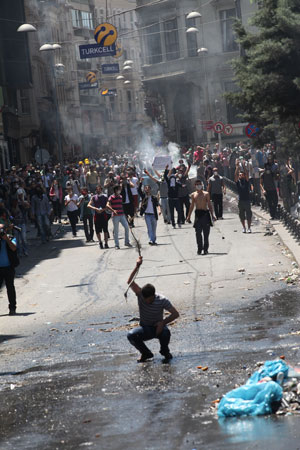
Protesters in Taksim Square continue the second day of demonstrations. (Photo: SADIK GÜLEÇ /Demotix)
Ece Temelkuran asks why the Turkish government is afraid of the internet
Against a backdrop of unrest that started in an Istanbul park last week and has spread throughout the country, Turkey’s Prime Minister Recep Tayyip Erdoğan yesterday described social media as “the worst menace to society.”
In the last 10 years whenever Erdogan implied his dislike, dissatisfaction or even displeasure towards any single person or any institution, suppression has followed shortly after. That is why many protest supporters in Turkey are now expecting Twitter and Facebook to be cut off. And at the moment it is a matter of life or death for citizens of Turkey. Here is why.
As the protests, which started in reaction to plans to build a shopping centre in a park, quickly escalated and spread in reaction to police heavy-handedness, Turkish Twitter users with high number of followers have been receiving tweets crying for help from several cities all over the country. Tweets like:
“We are stuck in …. Police attacks fiercely. Please RT!”
“We are choking. The tear gas incredible. Ambulance! Please help us!”
“Don’t go to …. There is a police trap! Spread the news” “Guys in Beşiktaş! The Hotel is giving shelter. Please RT!”
Or even:
“My friend is dying. We are at …! Please help us!”
And the ones who want to help reply:
“We have anti-acid solution. Five litres. Where shall we come? RT Please!”
“We are lawyers offering legal help. Tell us where you are!”
“We have 100 gas masks. Tell us where we should leave them? RT”
Since the media has been silent on the events of the past few days, people turned to Twitter for news on the protests and tips on staying safe. These are the people Erdoğan now calls troublemakers.
A broad range of Turkish society has taken part in the protests. It is not only secularists who were concerned with rising conservatism, nor the Leftists that were constantly targeted by rising authoritarianism who are protesting: Religious conservatives have also joined the protests in large numbers.
Even the most depoliticized people have taken to the streets. Despite the massive number of arrests and threats personally from the PM, the anger at the moment is out of control in several cities. It is not only police tactics in dealing with the protests that have caused public outrage, it is the “vocabulary” of the prime minister.
Prime Minister Erdoğan yesterday described the thousands of protestors as “bunch of looters” and Twitter users as “provocateurs”.
Many Turkish tweeters have added “the looter” to their name on Twitter, embracing the description of the PM. The “troublemakers” have their own outlet now. They don’t need the mainstream media as much as they needed them before. For Turkey’s authorities, this is big trouble, for sure.
Related: Turkey losing its way on free speech
The protests erupting across Turkey have shown a wider audience – domestic and international – the increasingly problematic nature of Turkish democracy, and its growing authoritarian tendencies. Index on Censorship CEO Kirsty Hughes writes
Index Events
Join Index on Censorship and a panel of Turkish and British writers to discuss free speech in Turkey, 22 June, Arcola Theatre London
3 Jun 2013 | Europe and Central Asia
Russia’s drive against lesbian, gay, bisexual and transgendered people continues unabated as the country’s Duma considers a law banning “homosexual propaganda”, Elena Vlasenko reports from Moscow.
Before 1993, being a homosexual in Russia meant the possibility of being sent to either a mental institution or prison — and it wasn’t until 1999 that it was dropped from the country’s official list of mental illnesses. Even though homosexuality was eventually decriminalised twenty years ago, there is still an active campaign to silence Russia’s gay community.
More than 70 per cent of Russians consider the LGBT community to be “dissolute” and “mentally retarded”. The government has nourished the already negative public opinion around homosexuality. Ten Russian regions have implemented laws banning “homosexual propaganda” since 2006, and the country is currently considering passing a countrywide ban.
Related: Ukraine holds first gay pride parade amidst intolerance and suppression
Andrew Connelly reports from Kiev on the backlash faced by participants in the country’s first gay pride march.
The bill was passed unanimously in a preliminary vote at the start of this year, and this month it will be considered by the State Duma. The law forbids promoting information about homosexuality amongst minors. If caught spreading the message that “traditional and non-traditional relationships are socially equal” to minors, offenders face criminal charges and a fine of up to 500,000 Roubles (£10,782).
Activists have expressed concerns over the law, which they say gives the authorities ground to fine organisations and activists for public work — in the name of protecting minors.
In addition to its campaign against “homosexual propaganda”, the country has never sanctioned a gay pride parade. Approximately 30 LGBT activists were arrested on 25 May for attempting to hold unsanctioned protests against discrimination, in front of the State Duma’s building. In 2011, the European Court of Human Rights (ECHR) declared the ban to be illegal. According to gay rights activist Nikolay Alexeev, the annual bans on pride parades as well as his own appeals to the ECHR should make it clear to the court that Russia’s violations of gay rights are systematic.
Russia was recently rocked by a violent homophobic murder: Vadislav Tornovoy was allegedly brutally beaten and murdered by 2-3 drunk acquaintances last month. Investigators say that Tornovoy came out to his friends, and they then broke his ribs, and pushed beer bottles into his anus. After a failed attempt to set him on fire, the men smashed unconscious Tornovoy’s head with a 20 kg stone. Alexeev told Index that the authorities’ policies towards the LGBT community reflect a deep-seated homophobia in Russia, and unless they change the country would still continue to see cruel and homophobic attacks.
3 Jun 2013 | Europe and Central Asia
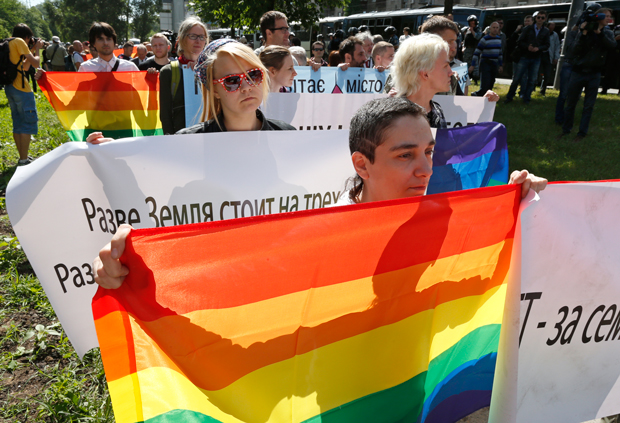
Despite intolerance and government suppression, LGBT supporters held the first gay pride march in the Ukraine. (Photos: Ivan Chernichkin for Index on Censorship)
Despite an initial ban by the authorities, Ukraine successfully held the country’s first ever gay pride parade but the level of intimidation faced by the lesbian, gay, bisexual and transgender community and proposed legislation outlawing ‘homosexual propaganda’ are causing concern for many. Andrew Connelly reports from Kiev
Last week, around 50 LGBT activists gathered on the outskirts of the Ukrainian capital Kiev to conduct the first ever equality march in the post-Soviet nation’s history. The event took place amidst an unprecedented amount of security with several hundred riot police and Special Forces drafted in to protect participants from thousands of protesters from the Orthodox Church, Ukrainian and Russian nationalists and football hooligans.
The parade was originally planned to take place in the centre of town, beginning at Independence Square, the scene of Ukraine’s 2004 Orange Revolution which (temporarily) overthrew pro-Russian President Victor Yanukovich. However, the Kiev district city court banned the event citing the clash with Kiev Day, a series of cultural events held across the city. In reality it would seem that, whilst this was a consideration, the amount of anti-LGBT demonstrators that also submitted applications to hold parallel marches may have more profoundly influenced the authorities’ decision. Still, the move was enough to prompt organiser Stas Mischenko to accuse them of “depriving our right to freedom of assembly” and an alternative location had to be hastily arranged.
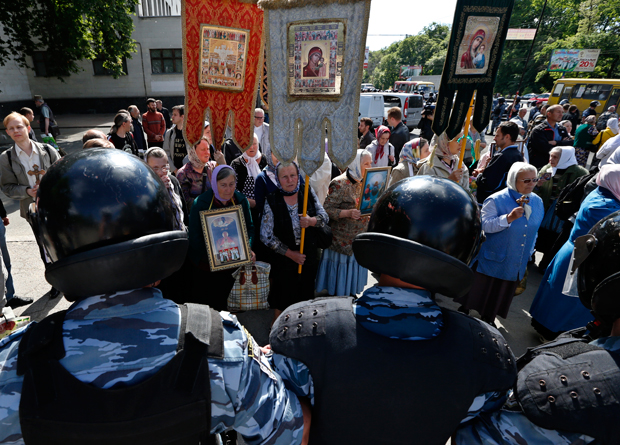
Counter demonstrators waved religious banners.
Despite the new site being kept secret, hundreds of crucifix-wielding protesters descended on Victory Avenue, waving banners with expressions such as ‘Kiev is not Sodom’ and ‘Homosexuality = Paedophilia’. LGBT activists were surrounded by lines of police yet the march was still intermittently disrupted when extremists managed to infiltrate the area, attempted to tear down banners and screamed ‘gays out of Ukraine’ and other epithets as they were dragged away into police vans. One firework was thrown that exploded in the middle of the crowd but nobody was injured. In total thirteen arrests were made.
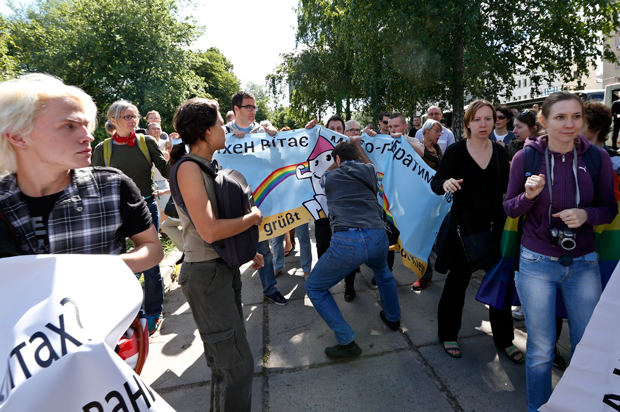
Opponents of the gay pride march attempted to disrupt by tearing down banners.
Nevertheless, the occasion was a marked improvement from last year’s attempt to organise a parade which was cancelled when police withdrew their guarantee of security an hour before the start due to threats from far-right hooligans planning to disrupt the event. Organiser Syvatoslav Sheremet was pepper sprayed then viciously attacked by thugs resulting in his hospitalisation.
Despite being the first post-Soviet country to legalise homosexuality, it remains a strongly taboo subject in Ukrainian society. There are almost no publicly gay figures and legislation does not recognise discrimination based on sexual orientation or gender identity. Ukrainian civil society groups are trying to press for anti-discrimination legislation at the same time as resisting two draft laws that would marginalise and severely infringe the rights of the LGBT community in addition to having a chilling effect of the freedom of the press.
Law 0945 concerns “the protection of children’s right to a safe information space” and proposes a ban on the production and publication of content which “promotes” and propagates” homosexuality that extends to the use of TV, radio, printing of publications, creative writings, cinematography or video materials.
Related: Shutting down Russia’s LGBT community
Elena Vlasenko reports on the continuing official campaign against lesbians and gays.
If this wasn’t authoritarian enough, Law 1155 is even more detailed, far reaching and restrictive in nature, calling for the “prohibition of propaganda of same-sex relationships aimed at children” defining homosexual propaganda as “intentional activity which aims to and is expressed in dissemination of any positive information about same-sex relations which could negatively affect…the development of the child including forming a misconception of traditional and non-traditional marriage relations being equal, and in the future impact his or her choice of sexual orientation.” This extends to a ban on media disseminating information from others that portrays same-sex relations in a positive light. Olena Shevchenko, head of the Kiev-based LGBT NGO Insight, outlines what this means in real terms:
“If you encourage a group of people to read a book of Oscar Wilde, it will be propaganda. If I give an interview in the mass media, openly say that I am a lesbian and that I think that it is normal, just like heterosexuality, then that will also be propaganda.”
Svitlana Tuchynska is a journalist at the Kyiv Post:
“If this law passes it will introduce media censorship. You will not be able to cover any activities of the LGBT community at all, any problems that they face or any opinions they have on their sexuality.”
The list of criteria is extensive, covering demonstrations, mass gatherings, workshops and classes amongst other public meetings. Violations of the law may result in fines reaching up to €2,400 or jail sentences of up to six years
“This legislation will affect us because we are spreading information about homosexuality amongst LGBT and the general population, that’s part of our job and this will definitely be considered propaganda”, Kiev Pride organiser and Vice President of Gay Alliance Ukraine Stas Mischenko explained.
“Such laws are very dangerous because I work in HIV prevention and people who are living under these harsh conditions don’t take care of themselves. They hear from other people that they are second class and they have no future, so they have risky sexual behaviour. If you are not able to explain to them that they are normal and good people, they will have more risky behaviour and the level of HIV will double or triple”, Mischenko said.
Ukraine currently has the highest HIV infection rate in Europe.
Hostile attitudes towards sexual minorities remains deeply rooted in Ukrainian society and these prejudices are now legitimised in parliament. Following the 2010 elections, the ultranationalist Svoboda (Freedom) party won 10% of the popular vote and have since stirred up homophobic, anti-Semitic and xenophobic sentiment in the country. In December 2012, an LGBT protest was disrupted by activists from the party who tear gassed and assaulted demonstrators, one of whom received a broken nose. On the official Svoboda website, a spokesman boasted of “breaking up the Sabbath of perverts”. Hate crimes are not legally recognised as such and are often referred to as ‘hooliganism’ with perpetrators rarely brought to justice.
The government in Kiev is currently deliberating whether to choose closer integration with Europe or to strengthen ties with Russia, but for Ukraine’s LGBT community the proposed propaganda legislation risks dragging the country to a much darker place entirely.
3 Jun 2013 | Digital Freedom, Middle East and North Africa
The Jordanian government began blocking over 200 websites on Sunday for failing to obtain licenses under a strict set of new guidelines, Ruth Michaelson reports.
Four amendments to the country’s press and publications law gave the government the power to censor sites that fail to comply, close outlet offices and hold the site owners responsible for posted comments. The changes to the law, which were introduced in 2012, sparked a backlash that saw 1,000 Jordanian sites stage a blackout on 29 Aug 2012. Undeterred, the government implemented the changes.
According to press reports, 281 sites have so far been targeted. The pro-government Jordan Times quoted Fayez Shawabkeh of the Press and Publications Department (PPD) as saying that his department was responsible for compiling the list of “unlicensed” sites, which was forwarded to the Telecommunications Regulatory Commission (TRC). In turn, the TRC pressured the country’s service providers to begin implementing the blocks.
It became immediately clear on Sunday that the block included many sites that fall outside the category of what Jordan Times described as “local broadcasters”. The website arabianbusiness.com reports that “some of the more prominent pages that have apparently been blocked by the government include Qatari news portal Al Jazeera, Time Out magazine, erotic publication Penthouse and the site of the Muslim Brotherhood in Jordan.”
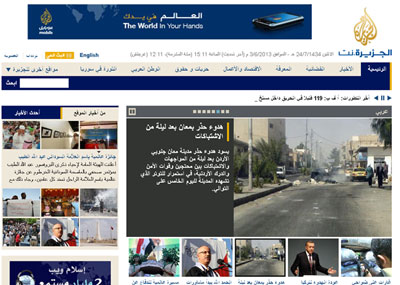
Al Jazeera is among the sites being blocked in Jordan for failure to obtain a license.
The amended press and publications law requires websites to obtain licenses similar to the rules that require printers to register, without regard to the differences between the mediums.
A rundown of the law on the website tamimi.com states that: “Jordan’s amendments to the press and publications law mean that owners of electronic publications, irrespective of where their offices are located, must take care when allowing their websites to be viewed in Jordan. While the amendments only contain four changes to the press and publications law, under the new legislative regime electronic publications that contain news, press reports, press releases and comments have an additional obligation to register, obtain a license and actively monitor the content of the publication in order to ensure that they are in compliance with the laws in Jordan.”
Therefore, the amendment is not simply regulating Jordanian sites, but any site available to view in Jordan- essentially requiring the entire Internet to comply with what appears to be a rather opaque and poorly defined category of regulations. In order to stay within the law, any site that wishes to be viewed in Jordan has to obtain a license and police the content of the site, irrespective of where it is in the world. The Jordanian government has “stressed that the law is aimed to organize the sector and provide legal guarantees against slander and unlawful material” according to AmmonNews. Given the flexible and rather expansive language of law, there also appears to be few guarantees or safeguards that the government won’t block a site arbitrarily or simply amend the law to block sites that it wishes to target.
The stated framework of this law also raises questions as to whether sites like Al Jazeera, Penthouse, Time Out or the Muslim Brotherhood would ever be able to obtain licenses to be viewed in Jordan. Last year, the country’s parliament considered a law that would have banned the Muslim Brotherhood from participating in the then upcoming election, on the basis of banning “religious parties” and Al Jazeera has sometimes been regarded as the fuel of anti-government protests across the Middle East. Penthouse would undoubtedly fall foul of public decency laws. It is unclear precisely what threat Time Out poses.
It is also unclear at present whether the Jordanian authorities will continue to ignore to the intense pressure from press freedom and civil society groups such as the Jordanian Centre for Defending the Freedom of Journalists, who described the law as “storm[ing] the freedom of electronic media”. Yet on the same day that the new law went into affect, King Abdullah launched his “Democratic Empowerment Programme”, dubbed Demoqrati, which according to The Jordan Times “is founded on development-boosting values such as the rule of the law, rejection of violence, acceptance of others, dialogue and accountability. It is also meant to stimulate civil society institutions to play their role as a key supporter of citizens and issues of concern to the public.” It appears that the Kingdom is yet to regulate irony.





